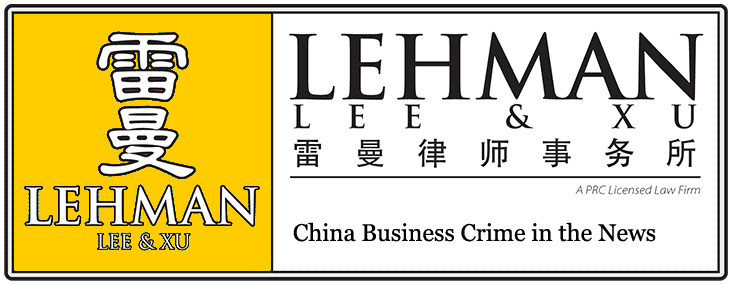
 |
|
LEHMAN, LEE & XU China Lawyers
|
|
China Business Crime In The News
|
|
March 2013
|
The China Law News keeps you on top of business, economic and political events in the China. |
|
|
|
In the News |
China Finance: Corporate governance is next issue to watch |
Investing in smaller Chinese companies can be highly profitable, and there’s undoubted upside potential in many of these stocks. However, there are also plenty of issues involved with many companies especially if we move into the smaller exchanges where corporate governance issues are common. One company that can be used as a potential example of some of these issues is China Energy Corporation (OTC: CHGY). The company has been having troubles for some time and is currently trading at a P/E of 0.31, which is a fairly obvious undervaluation and which is based on accounting concerns like so many others. The company’s accountants resigned relatively recently and declared that previous financial statements were not to be relied upon. This is seldom good news, but as the stock was an RTO, the damage was compounded due to the tarnished reputation of RTOs overall. The real corporate governance problem with the company is that the management team and the founder have a significant majority of the voting rights. It would therefore be easy for them to simply steamroll the smaller investors in any vote. This is exactly what happened when the company filed to go private. In order to go private there has to be approval from an independent committee which in this case was comprised of China Energy Corporation's lone independent director. He was appointed just months before making the decision. This in itself was, to say the least, a very interesting situation, but it gets even more interesting when we look at the fair value evaluation used to guide the decision. The work was done by a smaller firm, as you’d expect for a company the size of CHGY, but there are some interesting things to note. According to the documents filed with the SEC, three valuation methods were used to gauge the value of the company. The first was a market valuation approach, but the evaluators couldn’t find any companies they considered comparable to CHGY so the market valuation is based on the company’s current market price, which at the time was $0.12. While this may be acceptable under the presumption that the market always prices companies correctly, however, when evaluating whether or not an offer to go private is fair for a company that seems obviously undervalued, it seems perhaps a strange choice. This data was backed up by an income valuation that came to the exact same number, after discounting the original valuation by 97 percent due to SAFE restrictions on transferring cash out of China, and the fact that the company was not planning on distributing any dividends. The 97 percent figure was not explained in the filings I’ve seen, but even if we take into account that the entire company appears to be a variable interest entity, or VIE (i.e. controlled via contracts rather than equity ownership which has tax implications), the number seems very high. Perhaps most interesting is that the asset valuation model which was not used because the company is a going concern and the minority shareholders did not have enough power to force a liquidation, came up with a value of USD 2.29 per share which is likely something closer to the value minority shareholders were looking for if the market turned. While the auditor’s resignation implies that we probably cannot rely completely on the accounts of the company this still seems like a very low valuation, and minority investors in the US are likely to be quite upset, especially considering they didn’t get a chance to have a say on the matter because the management team could simply approve the deal. The conflict of interest here is not uncommon but the situation has put it in pretty sharp relief. Investors need to take these potential issues into account when making long term bets on undervalued Chinese companies. There are plenty of smaller companies listed where the management team could steamroll minority shareholders in these types of situations. Minority shareholders could try for a lawsuit, and because the holding company is in Nevada, they have a better chance than would be the case with a Cayman or BVI company. But as the entire company seems to be held in VIEs where the enforceability of contracts is questionable, it’s possible that the owners would simply break the contracts and move on leaving investors holding a grudge and potentially a bill for the lawsuit. Source:China Finance Link: http://www.tradingfloor.com/posts/china-finance-corporate-governance-issue-watch-1707501619 |
|
|
|
|